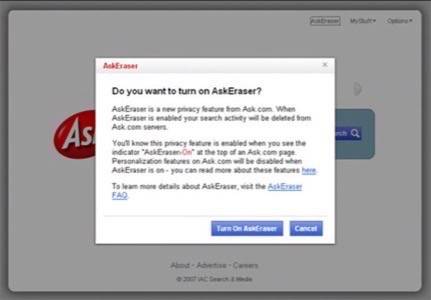Fourth-ranked US search engine Ask.com is tonight releasing a new feature, AskEraser, that will let users control the destiny of their search data. When enabled, AskEraser will automatically delete any user data created during future searches from Ask’s servers. That includes IP address, user and session IDs, and the text of the specific search queries. Once on, AskEraser works across any of Ask.com’s vertical search engines, as well as consumer applications such as Maps & Directions.

Earlier this year Ask.com implemented a new data retention policy in which search queries are disassociated from IP address and user IDs after 18 months. AskEraser, though, puts users in the driver’s seat regarding whether their data is stored at all. AskEraser was first announced in July and goes live today in the US and the UK, and will be rolled out globally in 2008.
“Anonymized search data provides online companies with important information to optimize the overall search experience,” said Doug Leeds, senior vice president at Ask.com, in a press release. “At Ask.com, that aggregate information is already guided by strong privacy standards and policies. But for those who place greater importance on protecting their search data and their online privacy, AskEraser takes care of their concerns by putting consumers in charge.”

While AskEraser is active some of Ask.com’s personalizations features that rely on user activity data or storing information in cookies are necessarily turned off. Users won’t be able to set custom skins for the Ask.com homepage while the Eraser is turned on, nor will they be able to utilize the site’s “MyStuff” personal bookmarking service.
Privacy: A Trend to Watch
Following recent high profile privacy dust-ups, like Facebook’s run-in with MoveOn over its Beacon ad system, or Google’s troubles with the EU over its proposed DoubleClick acquisition, it seems likely that users may start becoming more sensitive to their privacy online. How personal data (including implicit data like search history and clickstream data) is being collected and used will become a more important topic for web users over the coming year.
Ask.com has been trying to take a leadership role in the development of online privacy standards. In September, they joined with Microsoft in urging for the creation of a set of industry standard “global privacy principles for data collection, use and protection related to search and online advertising.”
Don’t be surprised to see privacy emerge as a big trend in 2008.

The Next Step
AskEraser is a great step in the right direction in terms of handing privacy controls to the user, but it is far from perfect. When it becomes an ‘either or’ proposition between privacy and the ability to use useful features like Ask.com’s MyStuff, the user isn’t necessarily the winner.
A logical next step might be to embrace the APML standard as their own Bloglines product is planning to do. By allowing users to capture their search data and add it to their APML profile it would let them control how that data is shared and used. Further, more granular privacy controls on how Ask.com is using captured data would be welcome — i.e., so that personalization services could be active, but users could still opt-out from data being stored long term, could have access to tools allowing them to cleanse or remove specific data, or could control exactly how their attention data is being used to do things like target ads.
What do you think about AskEraser? What sorts of privacy controls would you like to see search engine institute? Sound off in the comments below.





















